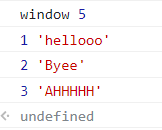//scope : variable access, what variables do I have access to when a code is running?
var fun = 5;
function funFunction() {
// child scope
var fun = "hellooo";
console.log(1, fun);
}
function funerFunction() {
// child scope
var fun = "Byee";
console.log(2, fun);
}
function funestFunction() {
// child scope
fun = "AHHHHH";
console.log(3, fun);
}
console.log("window", fun);
//scope : variable access, what variables do I have access to when a code is running?
var fun = 5;
function funFunction() {
// child scope
var fun = "hellooo";
console.log(1, fun);
}
function funerFunction() {
// child scope
var fun = "Byee";
console.log(2, fun);
}
function funestFunction() {
// child scope
fun = "AHHHHH";
console.log(3, fun);
}
console.log("window", fun);
funFunction();
funerFunction();
funestFunction();
Look at this.
//Root Scope (window)
var fun = 5;
function funestFunction(){
//child scope
console.log(fun);
}If we run funestFunction,
-console.log(fun): Do you know what fun is?
-child scope: sorry, I don't really know fun but ask my parent.
So now we go into outside of the function.
In this case, root scope.
Do you know fun?
-root scope: yah! We have a variable fun. It equals 5.
Now 'console.log' can log 5.
If fun doesn't exist. then we get an error.
So the last check is always the root scope.